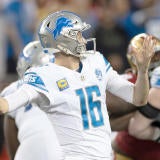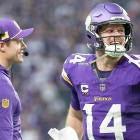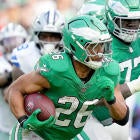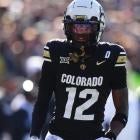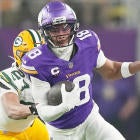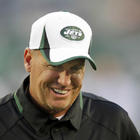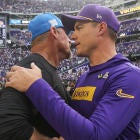Less than 12 hours after Ezekiel Elliott accused the NFL of orchestrating a "conspiracy" against him, the league has responded by denying Elliott's accusations.
A league spokesman told NFL.com on Friday that the idea of a conspiracy against Elliott is a myth created by the people representing the Cowboys running back in his battle against the NFL to get his six-game suspension overturned.
"They're trying to create a grand conspiracy story where none exists," league spokesman Joe Lockhart said on Friday.
Lockhart's statement came just hours after the NFLPA filed a petition on behalf of Elliott in the Eastern District Court of Texas. The petition asked the court to overturn any future suspension ruling from Harold Henderson, who served as the arbitrator during Elliott's appeal.
The NFLPA's lead attorney representing Elliott, Jeffrey Kessler, is the same lawyer who represented Tom Brady during Deflategate.
In the petition that Kessler filed on Thursday, the NFLPA claims that there was a "league-orchestrated conspiracy by senior NFL executives ... to hide critical information."
One of the key claims made by Kessler is that the NFL "deliberately omitted a conclusion" that had been made by the league's lead investigator, Kia Roberts. As the NFL's point person in the Elliott case, Roberts was the only league employee who was able to interview Elliott's accuser, Tiffany Thompson, during the league's 13-month investigation.
After she finished her part of the investigation, Roberts apparently made it clear that she didn't think that Elliott should be suspended because she believed Thompson "was not credible in her allegations of abuse," according to the petition.
The petition also noted that the 160-page report that the NFL filed when Elliott's suspension was announced on Aug. 11 purposely left out a conclusion so that the league didn't have to publicize the fact that Roberts thought Elliott should get off with no suspension.
As the petition notes, if the report had included Roberts' beliefs, the NFL "would have had to reveal her conclusion, as an experienced lawyer and prosecutor, that there was not sufficient evidence to proceed with any discipline."
The Fort Worth Star-Telegram also noted that the league purposely kept Roberts out of the punishment process. Senior vice president for investigations Lisa Friel, who ultimately recommended the six-game suspension for Elliott, reportedly barred Roberts from attending a meeting that involved several other high ranking league officials.
However, the NFL has denied that claim.
Lockhart told Pro Football Talk on Friday that Roberts wasn't barred from the meeting.
"I can tell you without any hesitation that this is false," Lockhart said.
According to Lockhart, NFL commissioner Roger Goodell was aware of the fact that Roberts didn't believe that Elliott should be suspended.
The reason that Roberts wasn't asked to participate in the discplinary process is because that wouldn't be normal protocol, according to Lockhart. When he spoke to NFL.com, Lockhart was directly asked if it was common for an investigator -- like Roberts -- to "make a disciplinary recommendation in such a case."
"No. In fact, at Kia's level, she wouldn't, and she didn't," Lockhart said. "She made her point of view on particularly the credibility issues known in the report; they are reflected in the report. It is the commissioner and the commissioner's sole role to decide on discipline. In fact, the union filed a grievance to force him not to delegate the decision" on disciplinary decisions under the personal conduct policy that was strengthened in Dec. 2014.
Using findings from Roberts' investigation, the NFL decided to give Elliott a six-game suspension. In the league's final report on the Elliott investigation, the NFL justified Elliott's suspension by mentioning that he had caused injuries to Thompson on at least three occasions over a five-day period. The league also pointed out that there were photos of Thompson's injuries that corroborated her story.
If Elliott's suspension is upheld on appeal or if he's unhappy with the outcome, the case will only get messier. If Elliott's case does end up in court, the running back would be allowed to play if the court grants him an injunction. An injunction was why Brady didn't have to serve his suspension until 2016 even though he was given the suspension in May 2015.
On the other hand, if the case goes to court and an injunction isn't granted, Elliott would likely have to start serving his suspension right away. As of right now, everything is in the hands of appeals officer, Harold Henderson.
There's big pressure on Henderson, who is likely going to have come up with an airtight decision over the next four days. According to ESPN.com, the hope is that Henderson will have a decision about the Elliott appeal by Monday.








